Are you experiencing a perplexing situation where your car’s alternator starts emitting smoke upon connecting the battery? This distressing issue can be a sign of underlying electrical faults that require immediate attention. Understanding the root cause is crucial to preventing further damage and ensuring your vehicle’s safe operation. This comprehensive guide will delve into the potential reasons behind alternator smoking, providing a step-by-step approach to diagnosing and resolving the issue effectively. Additionally, we will explore essential preventive measures to minimize the risk of future occurrences.
Why is my alternator smoking when I connect the battery?
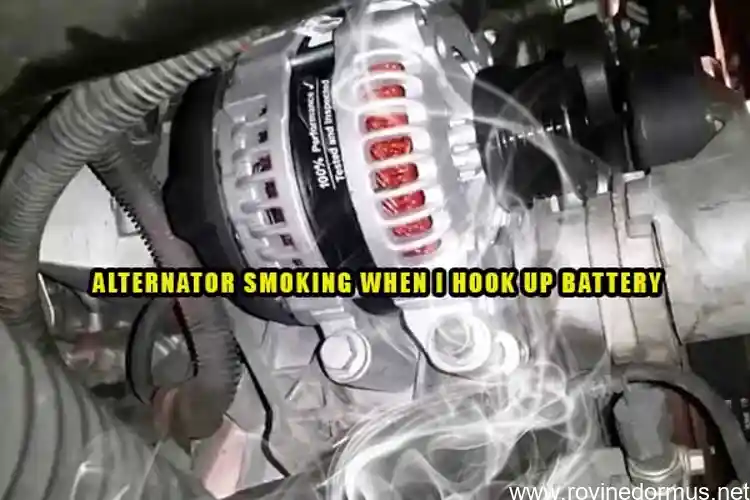
Is there any sound more unsettling than the sizzle of smoke when you hook up your alternator? It’s like a warning bell that something is seriously wrong. Don’t ignore it. Alternator smoking is a sign that there’s a problem that needs to be addressed immediately. Before you start tearing into your vehicle’s electrical system, though, take a deep breath and let’s troubleshoot the cause of that smoky situation.
Whether it’s a loose wire, a faulty diode, a short circuit, or an overcharging issue, we’ll help you diagnose and fix the problem so you can get back on the road with peace of mind.
Diagnosing the cause of alternator smoking
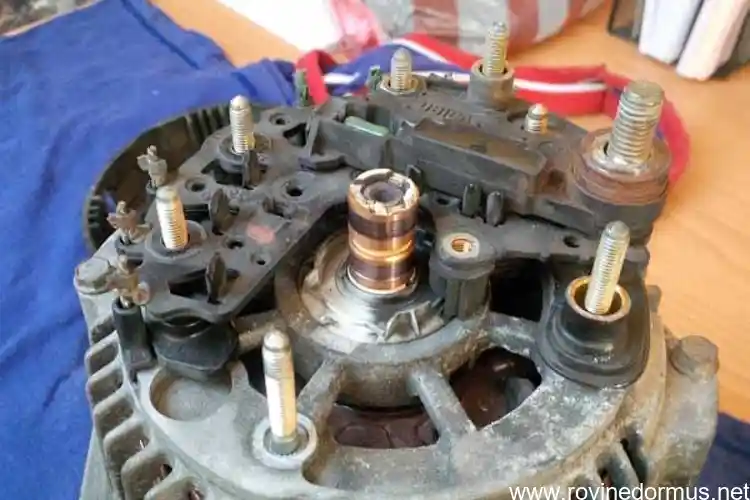
If you’ve ever connected your battery only to see your alternator smoking, it can be a frightening sight. But don’t worry, it’s not necessarily a sign of imminent doom. The smoke is usually caused by a loose or damaged wire, a bad diode, a short circuit, or overcharging. In this section, we’ll help you diagnose the cause of the smoking and provide a step-by-step guide to fixing it.
We’ll also discuss how to prevent alternator smoking in the future and answer the question: can you drive with a smoking alternator? So, if you’re ready to get your alternator smoking under control, read on!.
Loose or Damaged Wiring
You know that sinking feeling when you connect your battery and the alternator starts smoking? It’s like watching your car go up in flames in slow motion. Don’t panic just yet. In this article, we’ll dive deep into the causes of alternator smoking and guide you through a step-by-step process to diagnose and fix the issue. We’ll also uncover preventive measures to keep your alternator smoke-free, ensuring a smooth and worry-free ride.
.
Bad Diode
When your alternator starts smoking upon connecting the battery, it’s crucial to diagnose the underlying cause promptly. This issue signifies a problem within the alternator system that requires immediate attention. Ignoring the smoke may lead to further damage, potentially leaving you stranded with a dead battery or worse. To effectively diagnose the root of the smoking alternator, several steps are necessary.
First, visually inspect the wiring around the alternator for any loose connections or damage. Loose or frayed wires can create excessive heat and sparks, leading to smoking. Additionally, a faulty diode within the alternator can cause internal short circuits, resulting in smoke emission. Furthermore, a short circuit in the alternator’s circuitry or an overcharging condition can also trigger smoking.
Identifying the precise cause will guide you towards the appropriate solution, ensuring the restoration of your alternator’s functionality and preventing future smoking incidents.
Short Circuit
Diagnosing the root cause of your alternator smoking when you connect the battery is crucial to resolve the issue effectively. Here’s a step-by-step approach to help you pinpoint the culprit:1. **Inspect Wiring**: Loose or damaged wiring can create excessive heat and trigger smoking. Check the connections between the alternator, battery, and other electrical components for any loose or frayed wires.
Tighten loose connections and replace damaged wires as needed.2. **Test the Diode**: A faulty diode within the alternator can prevent proper current flow and lead to overheating. Use a multimeter to test the diode’s functionality.
If the diode fails the test, replace it promptly.3. **Check for Short Circuits**: A short circuit occurs when electricity takes an unintended path, causing excessive current flow. Inspect the alternator for any signs of burnt or melted wires, which may indicate a short circuit.
If you suspect a short circuit, seek professional assistance to locate and rectify the issue.4. **Overcharging**: An overcharging alternator can send excessive voltage to your battery, leading to overheating and smoking. Check the voltage output of the alternator using a voltmeter.
If the voltage exceeds the recommended range, you may need to replace the voltage regulator or the alternator itself.
Overcharging
When your alternator is smoking upon connecting the battery, it’s crucial to diagnose the underlying cause promptly. This issue can stem from various sources, each requiring a specific solution. Loose or damaged wiring, for instance, can create excessive resistance, leading to overheating and smoke. A faulty diode can also disrupt the alternator’s voltage regulation, causing it to overcharge and smoke.
Additionally, short circuits within the alternator can lead to excessive current flow, resulting in overheating and smoke emission. Finally, overcharging, often caused by a malfunctioning voltage regulator, can put excessive stress on the alternator, causing it to smoke. Identifying the exact cause of your alternator’s smoking issue is essential for implementing the appropriate repair.
Step-by-step guide to fixing alternator smoking
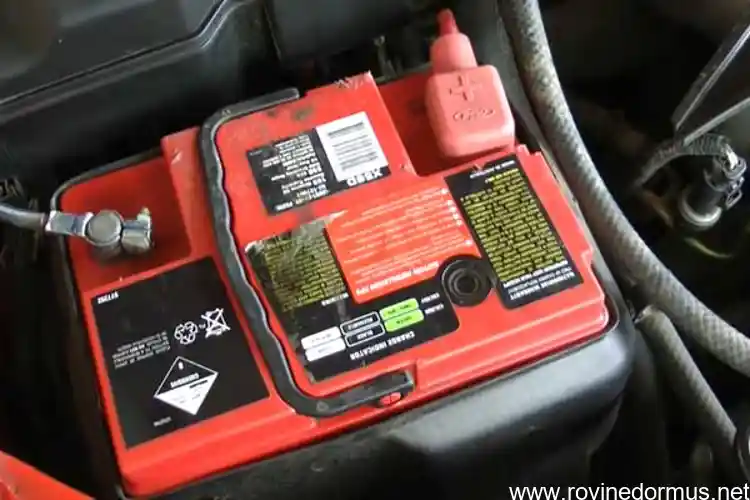
If you’re faced with the unnerving sight of your alternator smoking upon connecting the battery, don’t panic. It’s a common problem with alternators, and it can usually be resolved with a bit of troubleshooting. The first step is to inspect the wiring. Loose or damaged wiring can cause a short circuit, which in turn can lead to smoking.
If the wiring appears to be intact, the next step is to test the diode. A bad diode can also cause a short circuit and should be replaced if found to be faulty. Finally, if neither of these steps solves the issue, you may have a short circuit in the alternator itself. This will require professional repair or replacement of the alternator.
.
Inspecting wiring
**Step-by-Step Guide to Fixing Alternator Smoking**If you’re facing the unfortunate sight of alternator smoke, don’t panic! Follow this step-by-step guide to diagnose and fix the issue, restoring your alternator’s health. Remember, safety first: disconnect the battery before starting any repairs.1. **Inspecting Wiring:** Check all the wires connected to the alternator for loose connections, damaged insulation, or corrosion.
Loose wiring can create high resistance, leading to overheating and smoke.2. **Testing the Diode:** A faulty diode can cause the alternator to overcharge, leading to smoking. Use a multimeter to test the diode; it should show no conductivity in one direction and low resistance in the other.
3. **Checking for Short Circuits:** A short circuit in the alternator’s windings or stator can cause excessive current flow, resulting in smoke. Use an ohmmeter to check for continuity between the windings and the ground. If there’s continuity, it indicates a short circuit that needs to be addressed.
.
Testing the diode
If you’re facing the perplexing issue of alternator smoking upon connecting the battery, it’s crucial to take swift action to prevent further damage. The first step is to conduct a thorough inspection of the wiring. Loose connections or damaged wires can cause excessive heat and eventually lead to smoking. Check for any frayed, burnt, or disconnected wires and replace them as necessary.
If the wiring appears intact, the next step is to test the diode. A faulty diode can allow current to flow in the wrong direction, overheating the alternator and causing smoke. Finally, you should inspect for any signs of a short circuit. A short circuit occurs when current flows through an unintended path, creating excessive heat.
Check for any loose connections or damaged components that could be causing a short circuit. By following these steps, you can systematically diagnose and resolve the issue of alternator smoking, ensuring the smooth operation of your electrical system.
Checking for short circuits
It’s crucial to address the underlying cause of alternator smoking when you connect the battery to prevent further damage and ensure your safety. A step-by-step guide to pinpoint and resolve the issue will guide you through the necessary steps. Begin by meticulously inspecting the wiring for any signs of looseness or damage, as faulty wiring can lead to excessive heat and smoking. Next, test the diode using a multimeter to confirm its proper functioning.
A faulty diode can cause the alternator to overcharge, leading to smoking. Additionally, check for any short circuits within the alternator or its connected circuitry, as these can create excessive current flow and generate heat. By following these steps methodically, you can effectively diagnose and rectify the problem, restoring your alternator to optimal working condition and preventing future smoking issues.
Preventing alternator smoking in the future
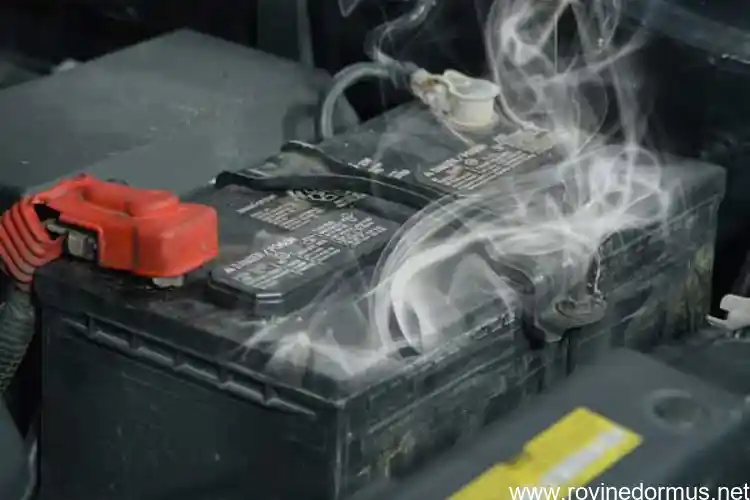
Preventing alternator smoking in the future is crucial to ensure the longevity of your vehicle’s electrical system. Regular maintenance and timely repairs can help you avoid this issue. Keep an eye on your vehicle’s battery and alternator, and replace them if they show signs of wear or damage. Loose or damaged wiring can cause alternator smoking, so make sure to inspect and tighten any loose connections.
Check for any signs of a bad diode, such as flickering lights or a humming noise from the alternator. If you suspect a short circuit, have your vehicle’s electrical system inspected by a qualified mechanic to identify and resolve the issue. To prevent overcharging, which can also lead to alternator smoking, have your voltage regulator checked and replaced if necessary. By following these preventive measures, you can minimize the risk of alternator smoking and ensure the smooth functioning of your vehicle’s electrical system.
.
Can I drive with a smoking alternator?
Can I drive with a smoking alternator? No, you should not drive with a smoking alternator. A smoking alternator is a sign of a serious problem that could lead to a fire or other damage. If you see smoke coming from your alternator, stop driving immediately and have the problem diagnosed by a qualified mechanic. Driving with a smoking alternator is dangerous and could put you and your passengers at risk.
.
Q1. Why is my alternator smoking when I hook up the battery?
Ans: A loose or damaged connection between the alternator and battery.
Q2. What causes an alternator to smoke when hooked up?
Ans: Overcurrent or short circuit in the electrical system.
Q3. Why does my alternator smoke when I turn on the car?
Ans: Faulty voltage regulator causing overcharging.
Q4. What to do if my alternator starts smoking?
Ans: Stop the car, disconnect the battery, and seek professional assistance.
Q5. Is it safe to drive with a smoking alternator?
Ans: No, it can lead to electrical damage and fire.
Q6. How can I prevent my alternator from smoking?
Ans: Maintain proper battery connections, avoid overloading the electrical system, and replace weak or faulty components.

I am Senior Project Manager at rovinedormus.net.

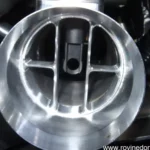



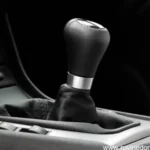
Leave a Reply